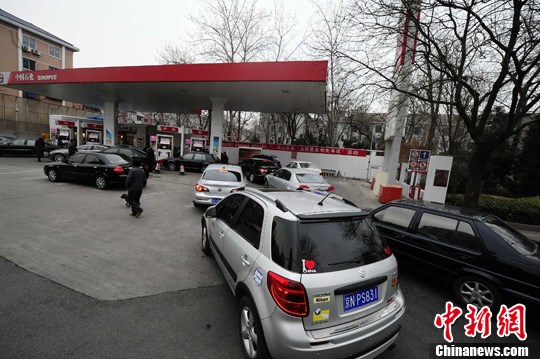
Cars queue up at a petrol station ahead of the price hike in Beijing on March 19, 2012. The retail price of 93 RON rose to 8.33 yuan per liter the followin day.
(Ecns.cn) -- A growing number of car owners in China have been complaining about the inferior quality of refined oil since the government lifted state-level gasoline and diesel prices last month for the second time in a year, reported the Southern Metropolis Weekly.
Over the past decade, the price of 97 RON gasoline, which is equivalent to premium gasoline in the United States, has nearly tripled, yet its quality is only equal to 87 AKI fuel in the US, a study said.
Fuel prices have become unaffordable for many domestic urban dwellers and even the National Development and Reform Commission (NDRC) has admitted that current retail prices of refined oil are higher in China than in the US.
Constant price hikes
Since the NDRC again raised prices of refined oil last month, 100 yuan (US$15.9) of 93 RON will only get you from downtown Shanghai to the suburbs; ten years ago, you could make a round trip between Shanghai and Hangzhou with that amount, complained Ma Le, a white-collar worker in Shanghai.
Back then, it cost little more than 100 yuan to fill up his compact car, Ma said, but now he pays over 400 yuan (US$63.5). Though he likes traveling in his own car, the increasing expense has forced him to curtail his driving.
Since the last increase, retail prices of refined oil have risen to record highs for China. On March 22, the retail price of 93 RON in Beijing was 8.33 yuan per liter, while a liter of similar gas cost the equivalent of 6.82 yuan in New York, 12.06 yuan in Tokyo and 14.39 yuan in London, according to statistics cited by Caixin Online.
In Europe, the retail price of gasoline is between the equivalent of 10 to 15 yuan (US$1.6 and US$2.4). However, most European countries levy a large amount of fuel surcharges, which are 40 to 60 percent of fuel retail prices.
In China, fuel taxes account for about 30 percent of prices, while the ratio is only 12 percent in the US – that is the main reason why retail prices of refined oil are higher here.
Currently, China adjusts its prices according to what the moving average of a basket of international crude prices are over a period of 22 working days, known as the adjustment window. If prices move more than 4 percent over this period, fuel prices are changed accordingly.
With international crude prices soaring, the price of 93 RON has been adjusted 37 times in the past ten years, noted the Southern Metropolis Weekly.
Under the influence of soaring fuel price hikes – along with projections of additional increases – prices of commodities and services are also on the rise, stoking inflation.
Unsatisfactory quality
Even if drivers can afford it, they are increasingly frustrated by the quality of the gasoline bought from Chinese filling stations.
At the end of last year, a picture made national headlines by comparing 93 RON gasoline provided by PetroChina to Sinopec's, revealing that the two samples were very different in color.
In January, Hong Kong-based media exposed the surprisingly excessive amount of sulfur in diesel in the Chinese mainland, which was 30 to 50 times higher than in Hong Kong.
Rong Guangdao, president of Sinopec Shanghai Petrochemical Company Ltd., explained that Sinopec is applying a new standard in Shanghai that is different from other parts of China, which explains why the samples looked so different.
Pengster, an American Chinese who works at Microsoft, said he is confused about the octane rating system in China and doubts the superiority of its so-called premium gasoline.
According to Pengster, China's 97 RON is not really "super unleaded" at all, but is in fact similar to the quality of 87 AKI in the US.
The problem has been created by underdeveloped emission standards, according to the Southern Metropolis Weekly. Starting on July 1, 2011, a new emission standard for automobiles was put into effect, but the new standard for refined oil will not come into force until 2014.
In a period of more than two years, many cars that meet the new emission standard can still use gasoline that meets the old emission standard – another reason for the poor quality of China's refined oil.
Time to upgrade
Because retail fuel prices are controlled by the government here, domestic oil companies must pay for oil and gas at market prices, but sell them at prices set by the state. As a result, companies such as PetroChina and Sinopec have long complained of the losses from processing crude; even following the hike, domestic margins still result in losses, said the Southern Economic Weekly.
However, these companies have other businesses apart from refining oil which are more profitable. Ma Le said he was angry that the companies always complain about their weaknesses, but avoid mentioning the profits.
And now that the quality of refined oil is all decided by giant oil companies in China – without much interference from the government – they should be more active in improving the quality, he added.

Copyright ©1999-2011 Chinanews.com. All rights reserved.
Reproduction in whole or in part without permission is prohibited.